Sir Vince Cable: We need to ‘detoxify’ the Lib Dems for LGBT voters
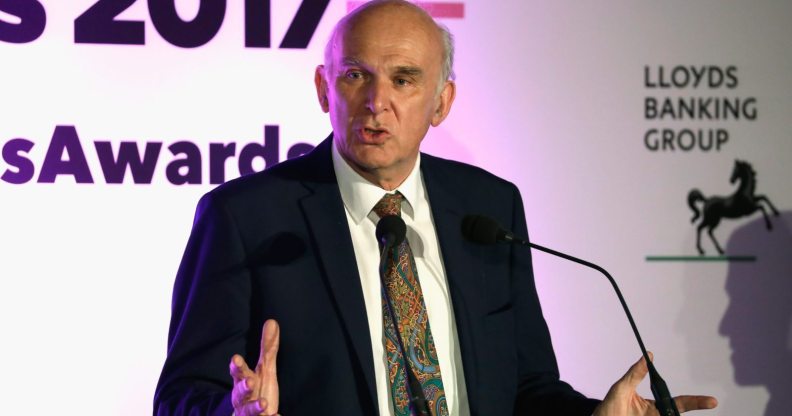
LONDON, ENGLAND – OCTOBER 18: Liberal Democrat Leader Vince Cable speaks on stage during the Pink News Awards 2017 held at One Great George Street on October 18, 2017 in London, England. (Photo by John Phillips/Getty Images)
PinkNews speaks to new Liberal Democrat leader Sir Vince Cable about his plans to tackle the party’s demons for LGBT workers.
Sitting down in Vince Cable’s office, we quip that it is nice to have a Lib Dem leader who is actually willing to do an interview with PinkNews.
No one laughs.
The former Business Secretary took over the reins of the liberal anti-Brexit party following the tumultuous collapse of Tim Farron’s leadership.
An evangelical Christian, Mr Farron’s leadership became defined almost entirely by a bungled row over LGBT issues, refusing to answer questions over his views on gay sex.
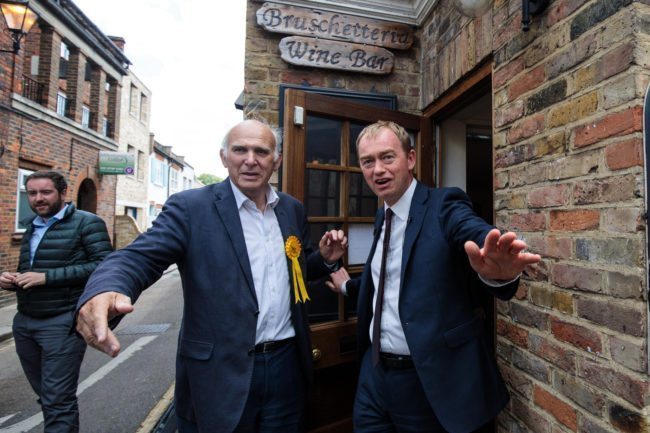
(Photo by Jack Taylor/Getty Images)
Mr Farron’s leadership died a death of a thousand cuts via the mainstream media, failing to address the issue week after week until the spat became terminal.
He spent the last months of his leadership essentially in hiding from PinkNews, rejecting multiple requests for a sit-down interview.
Lib Dem members have long cited the party’s record of championing equal rights before either Labour or the Conservatives – but PinkNews polling earlier this year showed that the party’s vote among LGBT people has been substantially drained.
Sir Vince, who was the only candidate to put himself forward to follow Mr Farron as leader, is candid about how poorly the issue was managed.
He says: “I don’t think it was handled very well… it did us quite a lot of political damage and we all know that. I am keen to get us back on track.”
Asked the same question that infamously felled Mr Farron – “Is gay sex a sin?” – Cable answers without hesitation.
“No. No. No I don’t.”
He does not appear to find the question impertinent, explaining: “There is another answer you could give, which is ‘I have my own private religious beliefs, but I am a public servant I’ve been elected by the public, I respect the views my party takes and the wider public interest’.
“But it happens on this particular occasion my personal views are aligned with the views I take as a Lib Dem MP and so I don’t have any problem with the question.”
He is less willing to criticise Mr Farron’s public comments since his resignation, however.
The ex-leader has branded his critics “slightly creepy”, insisting that liberalism as a movement needs to become “more tolerant” of people with religious views like his.
Sir Vince concurs: “We do need [to be tolerant]. We are a party committed to equality and that includes gay rights, but the simple truth is we have millions of people in the country who are committed Christians, Jews, Muslims who have a different view.
“We need to stand our ground in defence of secular values, but understand that people are coming at this from a different point of view in religious terms. I don’t think the two are inconsistent.”
The leader appears slightly complacent when asked how he will win back LGBT voters.
“It shouldn’t be a difficult problem, the de-toxifying,” he says. “Throughout our history, the Lib Dems were the people who actually lead the way in gay rights issues.”
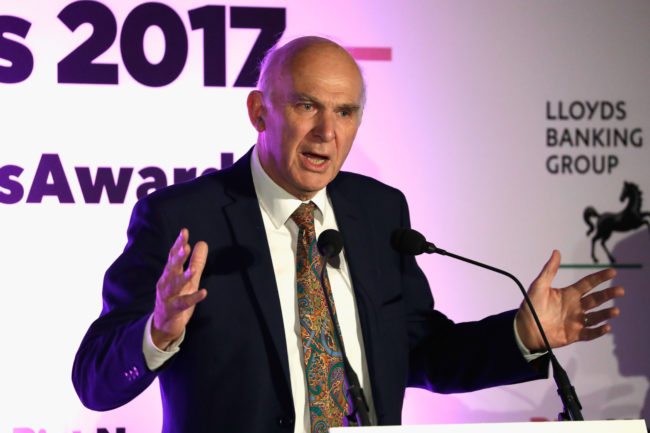
(Photo by John Phillips/Getty Images)
“As I said at the PinkNews Awards, it was SDP founder Roy Jenkins who brought the legislation that led to decriminalisation.
“It was liberals and social democrats who were making the argument for changing the law. We took a stand on Section 28 at a time many others were defending it.
“We were the first party to demand gay marriage, and then we persuaded the Conservatives to go along with it.
“So, we have a long and I think honourable history on LGBT rights.
“It was very unfortunate, the difficulties Tim had with squaring his Evangelical Christianity with the long-term commitment of the party to LGBT equality.
“It became an election issue among lots of supporters and lots of gay people, but if you look at the big picture, we should be at the top of the gay people’s voting preferences.”
Since the election, the Lib Dems in Parliament have stepped up campaigning on a host of LGBT issues – inclusive sex and relationship education in schools, reform of the Gender Recognition Act, HIV-preventing drugs on the NHS, global LGBT rights, and help for LGBT asylum seekers.
But while many in the party’s HQ appear keen to distance the new regime from Mr Farron’s, Sir Vince recently welcomed him back to the party’s front bench as Spokesperson for the North of England and Environment, Food and Rural Affairs.
Sir Vince hopes for him to play a “substantial” role in the party’s future, saying: “He’s obviously learnt from that unfortunate episode.
“As I say, he apologised, stepped down as leader, but he’s a very good liberal and genuinely a liberal. His voting record is exemplary on gay rights issues.
“He led the fight on refugees, is very strongly committed to the European project, [which] is the big issue of the day. He’s now committing himself to defending both his majority in parliament and on foreign affairs and on issues around the north of England.”
Our interview takes place amid another row in Parliament.
Old online posts surfaced written by Jared O’Mara, the Labour MP who unseated former Lib Dem leader Nick Clegg, in which he referred to gay people as “fudge packers” and “poofters”.
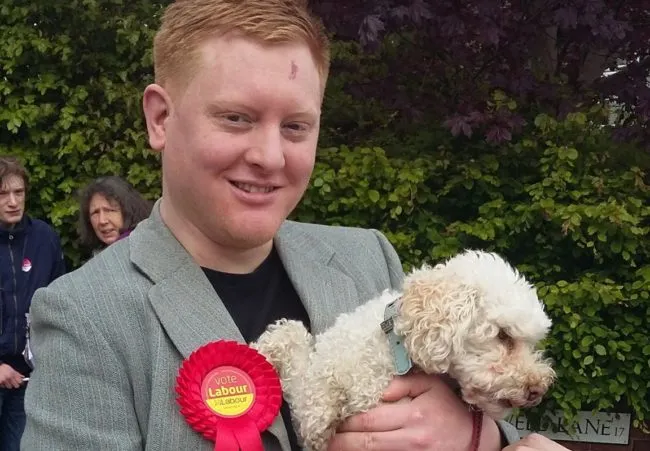
A number of women have also accused O’Mara of abusive conduct.
Within hours of the posts surfacing, Sir Vince had called for Labour to withdraw the whip from O’Mara. After two days of dithering, the Labour Party did exactly that.
Sir Vince says: “They finished up in the right place. After everything that’s been said, he had to lose the whip. It took time to get there.
“Every party has a crisis from time to time, and we have to look at the individual leading figures who get these issues wrong, whether it’s about sexuality or gender issues or race or whatever, and the key lesson from the past is to deal with it quickly.
“Once the facts are clear, you have to deal with it quickly and decisively, otherwise the things runs on and the wider public are left in some doubt as to what the commitment of the party is.
“They have got to the right place, but it did take quite a while.”
Of course, Mr Farron’s leadership is not the only shadow that the party is struggling to escape from under.
The party was nearly wiped out in Parliament in 2015, after the Lib Dem-Conservative Coalition government in which Sir Vince was a key player.
The leader remains defensive of the party’s record in government, citing equal marriage as a key achievement.
He said: “It wasn’t just that we had policies that appealed to lots of LGBT people, we actually delivered on them.
“We were a minority in the coalition, but we did actually deliver on the policies like gay marriage.”
Did he believe the Tories had truly changed their tune on LGBT rights, after some rapid evolution during the Coalition?
Sir Vince adds: “To be fair to them, I think Cameron and Osborne, who were the leading lights in the coalition on the Tory side, were genuinely liberal-minded people, and Theresa May also went along with it.
“I think there were other members in the party whose instincts were different and I think it’s to Cameron’s credit that he overrode them.”
He adds: “There’s been a lot of movement in public life generally, and I think that’s very welcome.
“I think Theresa May gave a very good speech [at the PinkNews Awards]. I suspect it doesn’t affect the views of a lot of her party members, but nonetheless, it was a good speech. It said the right things and I’m delighted that she did it.
“Similarly, the Labour Party has moved in a significant way, and actually all three parties are now roughly in the same place on this issue.”
However, he is concerned about the Democratic Unionist Party, a hardline anti-LGBT party from Northern Ireland, which is currently propping up the Conservative government.
The DUP has employed controversial powers in the region to override Parliamentary votes in favour of equal marriage, while DUP MPs in the Commons have declared that ‘it’s Adam and Eve, not Adam and Steve’.
Sir Vince says: “I feel uncomfortable with them holding the balance of power, partly for that reason and partly more generally.
“Recently there was a coalition who managed to reduce the dependence on the DUP over abortion rights in Northern Ireland, and I think that’s the way we need to proceed.
“There are obviously a number of Conservatives who are very uncomfortable with the DUP’s social policies. I would hope we’re in future able to form coalitions to override the backwards movement from the DUP.”
LGBT organisations in Northern Ireland have called for Westminster to intervene and secure equal marriage, as power-sharing has failed.
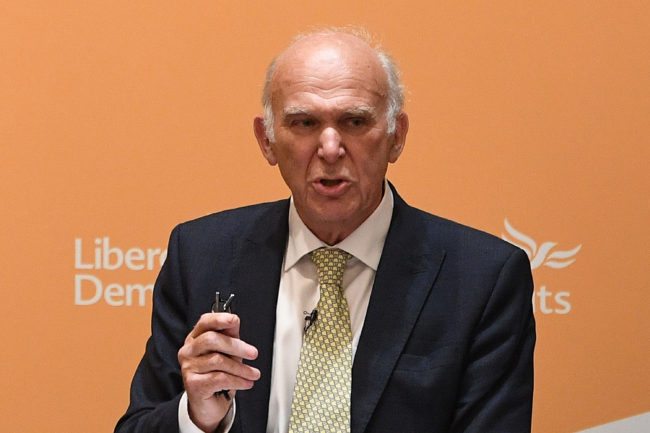
Vince Cable (Leon Neal/Getty Images)
Sir Vince responds: “I would in principle [support that].
“We have to be clear about respecting devolution, but when it comes to basic rights being infringed, it’s the overriding responsibility of the UK to ensure rights are not infringed. We should act accordingly.”
Asked if he would rule out Lib Dem involvement in any future DUP-reliant government, he deflects. “I can’t envisage being in government with the DUP, in almost any circumstances. I simply can’t envisage the circumstances.”
While LGBT equality may not be currently under threat in Parliament, Sir Vince notes there is an “ugly mood” in society.
Data earlier this month showed a 40% surge in hate crime reports in the year since the Brexit vote.
The leader says: “There’s been a rise in hate crime in general, and it’s one of the worrying features about our society.
“Race, Islamophobia, as well as attacks on gay people. There is an ugly mood, and we’ve got to counter it.”
The Liberal Democrats have a unique voice in the debate, having become a de facto single-issue party at the last election based on opposition to Brexit.
Though its supporters would deny it, the Brexit vote is seen by many as a rejection of the liberal consensus around tolerance and diversity as an extension of the global Trumpian movement.
Australian activists recently encouraged people to ‘do a Brexit’ and vote down proposals for same-sex marriage.
“There was an element of intolerance [to the Brexit campaign],” Sir Vince says.
“Some of the people who were advocates of Brexit did so from an entirely rational point of view. Calling for Brexit in itself is not intolerant, but as we know a lot of xenophobia and intolerance was whipped up in that.”
Alluding to Trump, he added: “There is a resurgence of reactionary, socially retrograde prejudices on a variety of fronts across the world.
“Liberalism has come under a lot of pressure, and we’ve got to fight our corner.”
2017 has also seen a more concerning trend of continuing clampdowns on the LGBT community in a number of countries across Africa and the Middle East.
Sir Vince, who in his past life as an economist lived and worked in Kenya and Nigeria, was candid about the challenges.
He said: “This is an issue in African societies that’s been brought to the surface by evangelical Christianity in some cases and Islam in others, and the way they’ve interpreted those religions. I know it’s a particular issue in Uganda, where people are persecuted.
“I think as a result of our aid relationships, we’ve got to make it clear to these governments that if there are egregious abuses, this affects our relationship with them, in terms of foreign affairs and aid.
“Even countries that were previously immune to this, like China and Russia, appear to be going backwards. As part of our general commitment to human rights, which we should be promulgating through our foreign policy and our aid policy, this is an important dimension.”

